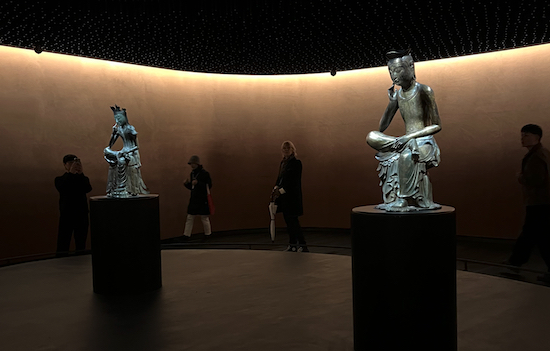Dear Jinul Master (not a star wars reference),
Today, I went to the National Museum of Korea. Viewing the famous 보살반가상 or Pensive bodhisattva for the nth time.
Afterwards I re-read your translated text.
You unified Seon Buddhism in Korea 800 years ago, something Chinese schools attempted at the time, but couldn’t do.
Wanting to read primary sources of Buddhist literature and avoid deviations as much as “possible,” I found your writing by way of Platform Sutra. But after this goal, I thought I needed to read the original untranslated versions to get to the “source and true meaning.”
Lately, I have been reviewing many students’ essays for college applications. Writing is a human activity, right? Not after 2020 with A.I…Don’t tell Plato, he would be extremely distraught. You probably don’t know him, but Plato believed writing was an untrustworthy ‘technology’ because it allowed the speaker to speak while being physically absent. One couldn’t engage in debate with an absent body, and Plato believed debate between people was the only way to get to the truth. This is somehow very related to Seon Buddhism.
I used to enjoy the writing process. I used to love working with my ambitious students perfecting their personal essays to their dream schools like Stanford, Yale, or UC Berkeley. I appreciated the struggle with mechanisms of language, the turbulent brainstorms that may never land.
But over the years, the English language has become increasingly stale, dry, and lacking. And lately, between learning Korean and teaching English, I feel that language — all language — is failing me.
For one, teaching English and explaining distinctions between “might”, “would”, “could”, or “I’m on it” and “I’m about to” actually means? reinforces my long held belief that English is a pretty shit language.
“pretty shit”
Saying what you mean and meaning what you say is pretty far from achievable.
Part II. Fluency happens with immersion in a culture and that can mean ego death.
Even though my Korean fluency is improving because:
- I had never worked for Korean companies using primarily Korean, but now I am
- I can read a few pages in Korean before my brain interrupts with “Hey! This isn’t English?”
It doesn’t feel like my Korean will ever reach the level of my English proficiency. Which is really to say, I don’t think I will ever be able to express my true self via Korean. While my early developmental years were only in Korean, which was the primary language in our house, at 6 years I was thrust into the U.S. education system, wondering about the strange sounds coming out of people’s mouths. While, at random, my brain will recall exclamatory and imperative Korean in the voice of my family members, it isn’t my voice. But (At the moment), if there’s just one meaningful take away from living in Korea, it’s that I better understand my immigrant parent’s struggles.
There’s no shortage of painful realizations that our cultural-linguistic differences are socialized programming, impossible to undo. It’s not just about language, it’s about the culture of that language.
For example, to survive in the west, you have to embody the grammatical subjectivity of the “I” or “ego”. This may be quite difficult for the east, which is collectivist.
As linguist James Gee explains, language– specifically discourse– is a social activity with embedded cultural values and behaviors.
We have case studies of English learning for native inhabitants in the U.S. state of Alaska, who are likely to have come from Asia. “Athabaskans are a group of people who have lived in North America for at least 10,000 years. Athabascans are descended from Asian hunter-gatherers, likely originally native to Mongolia, who crossed the Bering Strait and settled in North America.[14]”
According to Gee’s book Social linguistics and literacies: Ideology in discourses:
“Athabaskans differ at various points from mainstream Canadian and American English-speakers in how they engage in discourse. A few examples: …(2) For Athabaskans, people in subordinate positions do not display, rather they observe the person in the superordinate position. For instance, adults as either parents or teachers are supposed to display abilities and qualities for the child to learn.
However, in mainstream American society, children are supposed to show off their abilities for teachers and other adults. (3) The English idea of ‘putting your best foot forward’ conflicts directly with an Athabaskan taboo. It is normal in situations of unequal status relations for an English-speaker to display oneself in the best light possible…This English system is very different from the Athabaskan system, in which it is considered inappropriate [] to display oneself in a good light or to predict the future.
The Scollons list many other differences, including differences in systems of pausing that ensure that English-speakers select most of the topics and do most of the talking in interethnic encounters. The net result of these communication problems is that each group ethnically stereotypes the other. English-speakers come to believe that Athabaskans are unsure, aimless, incompetent, and withdrawn. Athabaskans come to believe that English-speakers are boastful, sure they can predict the future, careless with luck, and far too talkative.
The Scollons characterize the different discourse practices of Athabaskans and English-speakers in terms of two different worldviews or ‘forms of consciousness’: bush consciousness (connected with survival values in the bush) and modern consciousness. These forms of consciousness are “reality sets” in the sense that they are cognitive orientations toward the everyday world, including learning in that world.”
Despite my best efforts, I’m a purist and a pessimist. I never believed language could adequately express abstract human experiences. However, it’s clearly powerful enough to program behaviors and values. Across different cultural-linguistic groups there are incompatible worldviews or forms of consciousness. Incompatible means if one hasn’t dominated the other, there will be an enduring struggle for one’s worldview to survive. The third option is superficial exchanges.
These are just the things I’m thinking about these days. I used to get solace in rereading the almost oversimplified instructions of Seon texts. It sometimes recalibrates me. It sometimes throws me into the macro or micro. An echo chamber, but a safe one. I used to love writing, I used to love language. But just as connection requires two ideas to shake hands, I realize now my dream is dead.
Perhaps in the ethereal world you now reside, my intentions can be transmitted without the soggy human tongue.
Sincerely,
a confused mortal




